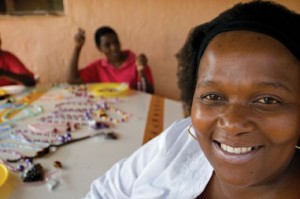The pope vs. condoms
When I first read Pope Benedict XVI’s recent comments about AIDS and condoms – “You can’t resolve it with the distribution of condoms,” he told reporters aboard a plane heading to Cameroon. “On the contrary, it increases the problem” – I flipped out.
I remember muttering to my husband on the train ride into work that it’s one thing for the pope to believe that sort of thing because of his religious beliefs; it’s another for him to actually undermine the work of NGOs like Oxfam around the world, which are encouraging prevention efforts.

Benedict’s remarks, which he made as he embarked on a tour of Africa, set off the expected firestorm. Governments in France, Germany, and Belgium expressed concern. AIDS activists expressed outrage. Rebecca Hodes of the Treatment Action Campaign in South Africa told the New York Times that if the pope actually wanted to prevent HIV infections, he would come out in support of broader access to condoms and help spread information on how to use them correctly. “Instead, his opposition to condoms conveys that religious dogma is more important to him than the lives of Africans,” Hodes said.
Hodes’ words pretty much summed up my feelings at the time. But then I came across a story in The Atlantic online that gave me pause. Ross Douthat writes that critics of the pope’s comments should take a moment to consider his actual job. “… Benedict XVI is the head of an international institution that does as much to fight disease and poverty as any NGO in the world. The Church runs hospitals, clinics, and schools; it channels hundreds of millions of dollars in donations from the developed world to the wretched of the earth; it supports thousands upon thousands of priests, nuns and laypeople who work in some of the most difficult and dangerous conditions in the world. And it does so based on the same premises – an attempt to be faithful to the commandments of Jesus Christ – that undergird the Pope’s insistence on preaching chastity, rather than promoting prophylactics,” he writes.
It’s an interesting argument. But it’s really just one that clouds the issue. Of course not having sex will prevent infection. The real question is this: Does having sex while using condoms also reduce the rate of infection? The UN agency fighting AIDS seems to think so.
In a statement released the day after Benedict’s comments, UNAIDS stated,”With more than 7,400 new HIV infections each day the world cannot stop the AIDS epidemic without stopping new HIV infections …Condoms are an essential part of combination prevention” which includes access to information about HIV, access to treatment, being faithful, and ensuring human rights.
In other words, abstinence isn’t bad. And neither are condoms. In a world where people keep having sex – Catholics included – isn’t it better to have all the weapons at the ready?
For more information on Oxfam America’s work on AIDS, which promotes women’s rights and policies that reduce vulnerability to infection, as well as access to care and medicines, go to http://www.oxfamamerica.org/whatwedo/where_we_work/southern_africa or http://www.oxfamamerica.org/whatwedo/campaigns/access_to_medicines .